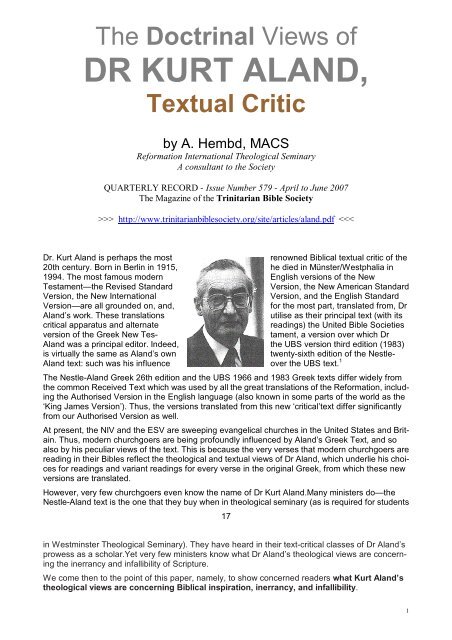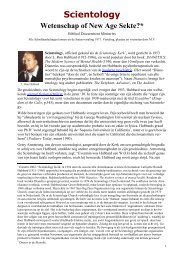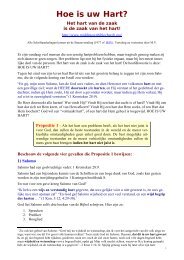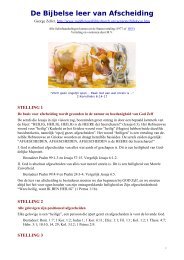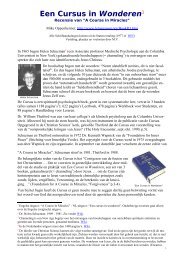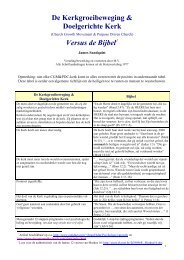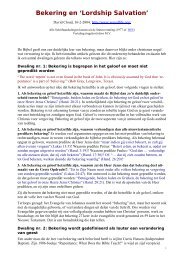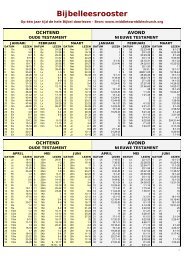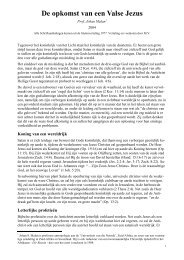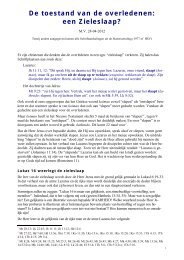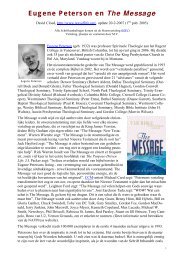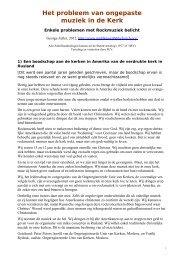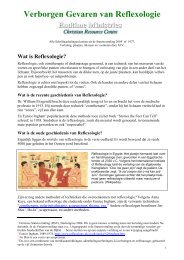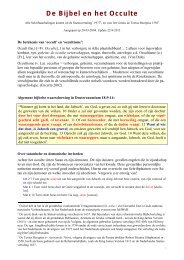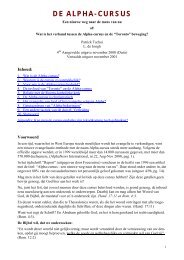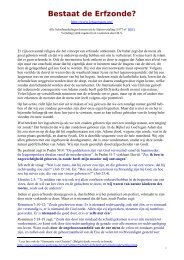DR KURT ALAND, - Marc Verhoeven
DR KURT ALAND, - Marc Verhoeven
DR KURT ALAND, - Marc Verhoeven
Create successful ePaper yourself
Turn your PDF publications into a flip-book with our unique Google optimized e-Paper software.
The Doctrinal Views of<br />
<strong>DR</strong> <strong>KURT</strong> <strong>ALAND</strong>,<br />
Textual Critic<br />
by A. Hembd, MACS<br />
Reformation International Theological Seminary<br />
A consultant to the Society<br />
QUARTERLY RECORD - Issue Number 579 - April to June 2007<br />
The Magazine of the Trinitarian Bible Society<br />
>>> http://www.trinitarianbiblesociety.org/site/articles/aland.pdf
But first, we must lay down some fundamental premises. This paper is the review of a Biblebeliever,<br />
and unashamedly so. Accordingly, we are not backward to affirm that, if we are to understand<br />
the text of the Old and New Testaments, we must know what the Bible says of itself. And so,<br />
we affirm that:<br />
*We must believe that the Bible is the inspired, inerrant Word of God, because the Bible itself<br />
says so.<br />
*We must believe that God preserves His Word, by His Holy Spirit, in the line of His true<br />
Church— again, because the Bible says so.<br />
We must believe that the Bible is the inspired, inerrant Word of God, because the Bible says<br />
so.<br />
*2 Timothy 3.16–17 ‘All scripture is given by inspiration of God, and is profitable for doctrine, for<br />
reproof, for correction, for instruction in righteousness: that the man of God may be perfect,<br />
throughly furnished unto all good works.’<br />
*Proverbs 30.5 ‘Every word of God is pure: he is a shield unto them that put their trust in him.’<br />
How much of Scripture is inspired, inspired indeed by God?’All Scripture.’ ‘All scripture is given by<br />
inspiration of God.’ The original Greek word for ‘inspired’ means ‘breathed out by God’. All Scripture<br />
is breathed out by God—every word of it. Accordingly, all Scripture is as pure as God Himself.<br />
No abiding corruption can enter into it. Though mistakes have entered some copies of the original<br />
language texts, though heretics have even mutilated some copies, yet, in the good Providence of<br />
God, by the Holy Spirit, the true Church has been enabled always to recover the true reading from<br />
the copies.<br />
Because Scripture is breathed out by God, the man of God is ‘perfect’, or ‘complete’. He is complete<br />
in that he has need of no other reference. Obviously, he is not sinlessly perfect: ‘…there is no<br />
man that sinneth not’ (1 Kings 8.46). But he is ‘perfect’ in this sense: he is perfectly furnished with<br />
all that he should ever need to know, on this side of eternity, to equip him for his ministry in this<br />
world—so that, as we have said, he has need of no other reference. Indeed, the only other references<br />
he may want to consider would be good commentaries on the Scripture itself, to help him<br />
understand the Scripture better. But even these commentaries the man of God would read as<br />
subordinate to the inspired Scripture itself. Oh, the man of God is complete in his being throughly<br />
furnished, by the fully-inspired words of God!<br />
The very thing that makes the man of God complete and throughly furnished unto all good works is<br />
the verbal plenary inspiration of Scripture. If the Scripture ceases to be inspired, and fully inspired<br />
in its every Word, then it is no longer reliable or profitable for doctrine, for reproof, for correction, for<br />
instruction in righteousness. The very attribute of Scripture that makes it reliable and profitable for<br />
these things is its plenary inspiration, its purity, its being ‘breathed out by God’.<br />
18<br />
Accordingly, the Scripture, indeed all Scripture, is breathed out and inspired by God still. The<br />
Scripture, every word of it, is still profitable for doctrine, for reproof, for correction, for instruction in<br />
righteousness: hence, it is also inspired still. Despite its being copied by men, despite mistakes<br />
and errors having been introduced into some of the copies, yet, in the good Providence of God by<br />
the Holy Spirit, the true Church has always been able to recover the original readings, so that we<br />
still have the inspired Word of God, infallible and inerrant.<br />
There may be spelling or stylistic differences in some of the words or their forms in the present<br />
manuscripts, but the essential words, in all their meanings, are still there—the inspired, inerrant<br />
words of God. The Holy Spirit, in the Church, has helped the true Church always to recover and<br />
maintain the true reading (Isaiah 59.21).<br />
And how pure are the Words of God? Totally pure. ‘Every word of God is pure’, says Proverbs<br />
30.5. ‘Every word of God is pure: he is a shield unto them that put their trust in him’. Every word of<br />
God is pure. It is pure still. It is pure, by the good Providence of God, preserving the inspired Word<br />
of God, for the man of God, so that he need not have recourse to any other work—so that by it, he<br />
may be made profitable to every good work. The good Providence of God has kept every word of<br />
God pure.<br />
2
‘He is a shield unto them that put their trust in him’, says Proverbs 30.5. Why? Because ‘every<br />
word of God is pure’. Take away the purity of every word, and God is no longer a shield to the<br />
saints.<br />
We must not doubt the purity of God’s Word, nor doubt His covenant faithfulness to preserve it. He<br />
Who cannot lie promises to preserve His Word; He promises to do so in that very Word. ‘All Scripture<br />
is breathed out by God.’ ‘Every word of God is pure.’ As Isaiah 59.21 tells us, God’s inspired<br />
words, all of them, shall be preserved in the line of the true Church, for ever.<br />
We must believe that God preserves His Word, by His Spirit, in the line of the true Church.<br />
*Isaiah 59.20–21 ‘And the Redeemer shall come to Zion, and unto them that turn from transgression<br />
in Jacob, saith the LORD. As for me, this is my covenant with them, saith the LORD; My spirit<br />
that is upon thee, and my words which I have put in thy mouth, shall not depart out of thy mouth,<br />
nor out of the mouth of thy seed, nor out of the mouth of thy seed’s seed, saith the LORD, from<br />
henceforth and for ever.’<br />
The Lord says, ‘this ismy covenant with them’. With whom?With those that ‘turn from transgression<br />
in Jacob’. These would be those who know ‘repentance unto life’—that saving work of the blessed<br />
Holy Ghost—by the Holy Spirit, convincing them of sin, righteousness, and judgment, and savingly<br />
illuminating their minds with the knowledge of the blessed Redeemer who has come for them.With<br />
these, and these alone, God makes His covenant. He sends the Redeemer to Zion, for them, and<br />
for them alone.<br />
And what is this covenant with them? The covenant is, that the spirit that is upon them, and the<br />
words that are in their mouth, shall not depart out of their mouth, nor out of the mouth of<br />
their seed, nor their seed’s seed. For how long? ‘For ever.’<br />
19<br />
The Lord makes a covenant with His Zion, with those that turn from transgression in Jacob. His<br />
Spirit shall not depart from them; neither will His Words. God will preserve all His words for them;<br />
‘every word of God is pure’. Why? So that He may be a shield to His saints, even by His Word.<br />
God will keep all His Word, the Scriptures of our salvation, inspired.Why? So that the man of God<br />
may be perfect, so that he may be complete, so that he may be throughly furnished unto every<br />
good work.<br />
Indeed, this very promise is because of the Redeemer, spoken of in Isaiah 59.20, Who is Christ<br />
Jesus our Lord, the Desire of all nations, that One who comes to Zion. Because of Him, God makes<br />
this wonderful covenant. Indeed, we see in Hebrews 9.19 that Moses sprinkled not only all the<br />
articles of the tabernacle and the people, but yes, even the very book of the Law, the Word of God,<br />
with the blood. Hebrews 9.19 says, ‘For when Moses had spoken every precept to all the people<br />
according to the law, he took the blood of calves and of goats, with water, and scarlet wool, and<br />
hyssop, and sprinkled both the book, and all the people’.<br />
Moses sprinkled both the book and the people.Why? Because this foreshadowed how that the<br />
blood of Christ would be sprinkled on both the people of God and upon the very words of God that<br />
God would use to keep them. In other words, Christ purchased both His people and the words<br />
of God by His precious blood. When the blood of Christ ceases to be efficacious, then the people<br />
of God can be lost. When the blood of Christ is no longer living and warm, then the purity of<br />
God’s words will be lost.<br />
No, this can never be! Whatever the blood of Christ touches, it purchases. The blood of Christ has<br />
purchased the purity of all the words of God in all ages, for you, for me, if we will but believe it.<br />
Now, with whom is this promise made? With those that turn from transgression in Jacob, and with<br />
their seed, and their seed’s seed, even for ever. The Spirit will continue with them. The efficacy of<br />
the blood of Christ will continue with them. By the covenant of this blood, and the workings of the<br />
Holy Spirit, this true Church will be able to discern the words of God in all ages; and by the good<br />
Providence of God all His words will remain with them.<br />
And thus, we should be looking to the original language texts that have been used by the historic<br />
true Church.<br />
3
What we must look for in a textual critic<br />
When we would evaluate the work of a textual critic—one who would compile a text of the original<br />
languages for the Bible—we must look for a man who believes the things which we have just discussed.<br />
He must believe that the Bible is the Word of God, because ‘every word of God is pure’.<br />
He must believe that God has promised to preserve that Word pure, in every age. He must also<br />
believe that God will do this in the line of the true Church.<br />
An examination of Dr Kurt Aland’s views on the inspiration of the Bible<br />
It can be rather difficult to find anything that openly displays Dr Aland’s views concerning the inspiration,<br />
inerrancy and infallibility of the Scriptures. However, there are three little-known works of his<br />
20<br />
that are most revealing, two relatively early works, written in 1961 and 1962, and one later work, in<br />
1985.<br />
We address first the two earlier works. One is entitled ‘The Problem of Anonymity and Pseudonymity<br />
in Christian Literature of the First Two Centuries’, written in 1961. 2 In that booklet, Dr Aland denies<br />
the apostolic authorship of the Four Gospels, the Catholic Epistles, the Pastoral Epistles, and<br />
Hebrews. The other work is entitled The Problem of the New Testament Canon, written in 1962. 3 In<br />
this work, Dr Aland expresses his doubts as to the canonicity of several New Testament books.<br />
Now, we must interject the following.With respect to the apostolic authorship of the Four Gospels,<br />
these books in their titles begin ‘The Gospel according to Matthew’ or ‘The Gospel according to<br />
Mark’, and so on. Though some may question whether the titles are inspired per se, yet we cannot<br />
deny that the titles of all the complete Greek manuscripts of the New Testament books, going back<br />
to the earliest of times, attribute the authorship of the Gospels to Matthew, Mark, Luke, and John,<br />
as did all the Church Fathers going back to the earliest ages of the Church. (For more detail on the<br />
variations that exist in the headings, and yet how they all attribute authorship to the men, the author<br />
refers the reader to F.H.A. Scrivener’s excellent work A Plain Introduction to the Criticism of<br />
the New Testament,1.65–71.) 4 Thus, there really is no manuscript or patristic evidence whatever,<br />
other than mere conjecture, that could merit Aland’s questioning who authored them. But unquestionably,<br />
a man who doubts the canonicity of several books of the Bible—specifically, 2 Peter, James,<br />
1 and 2 John, and Jude— cannot at all believe in Bible inerrancy. How can the Bible be infallible,<br />
if it has several books in it that do not belong there?<br />
It may be asked, “But The Problem of the New Testament Canon was written in 1962. Did Dr Aland<br />
ever renounce these views? And similarly with ‘The Problem of Anonymity and Pseudonymity’.<br />
That was written in 1961. Did Aland renounce its views?”<br />
No, he did not. Indeed, he had ample opportunity to renounce these views in his much later book<br />
entitled A History of Christianity, published in German in 1980 and in English in 1985. 5 In this book,<br />
Aland discusses his theories concerning the origins and the evolution of the New Testament text,<br />
including the settling of the Canon and the apostolic authorship of the Gospels, the Catholic Epistles,<br />
and Hebrews.Yet he says nothing in that work to renounce his former views. To the contrary,<br />
he cautiously confirms them, even adding shockingly disdainful, higher critical views of the Catholic<br />
Epistles—James, Jude, 1 and 2 Peter, and 1, 2, and 3 John. We will discuss what he says in A<br />
History of Christianity toward the end of this paper.<br />
Denying the canonicity of certain books of the Bible is certainly the more blatant of his errors. For<br />
that indeed is a denial of the verbal plenary inspiration of Scripture itself. For that reason, we shall<br />
begin by addressing Dr Aland’s work concerning the Canon. After that, we shall address what he<br />
says in ‘The Problem of Anonymity and Pseudonymity in Christian Literature of the First Two Centuries’.<br />
Next, we shall address what he says in A History of Christianity. Finally, at the end of this<br />
paper, we shall evaluate the validity of Dr Aland’s work, in the light of Scripture, specifically, Isaiah<br />
59.20–21.<br />
We proceed now to examine The Problem of the New Testament Canon.<br />
21<br />
4
The Problem of the New Testament Canon<br />
At the beginning of this work, Kurt Aland writes the following: ‘This brochure embodies the text of a<br />
lecture written for the Second International Congress on New Testament Studies which met at<br />
Christ Church, Oxford, in September 1961’. 6 The pamphlet, then, is a lecture that Dr Aland delivered<br />
to a worldwide convention of New Testament scholars.<br />
Just the title of the work is enough to raise eyebrows. The Problem of the New Testament Canon?<br />
What ‘problem’?<br />
For the reader not acquainted with the term, ‘Canon’means the listing of books that should be included<br />
in the New Testament. Dr Aland is in this pamphlet raising a question of whether new books<br />
not included in the Bible ought to be included, and also of whether books now included should be<br />
excluded. In the conclusion of his booklet, he does not advocate the inclusion of any new books,<br />
but he seriously advocates that we consider dropping 2 Peter, Hebrews, Revelation, Jude, and 2<br />
and 3 John.<br />
Says Dr Aland, pages 24–25:<br />
In spite of all the imperfections and uncertainties which surround the formation of the Canon,<br />
we must express our belief that the decision of the early Church cannot be bettered by any extension.<br />
It cannot be said of a single writing preserved to us from the early period of the Church<br />
outside the New Testament that it could properly be added to-day to the Canon: a revision of<br />
the New Testament Canon would be possible only by the suppression of what was then<br />
pronounced canonical, not by extending the Canon in any direction of our choosing.<br />
[emphasis added]<br />
In other words, he poses himself a conservative by saying somewhat ‘cautiously’ that we ought not<br />
to adopt any new books. However, says he, we may well considering rejecting some books. He<br />
later expresses his view that the Epistles of Ignatius surpass 2 and 3 John, Jude, and even 2 Peter,<br />
thus implying, on pages 26–27, that 2 and 3 John, Jude, and 2 Peter are candidates for being<br />
dropped. He says:<br />
The only group among the Apostolic Fathers which, by their content and spiritual authority,<br />
tower far above the average, are the Epistles of Ignatius. Certainly they cannot bear comparison<br />
with the Pauline Epistles, nor even with 1 Peter and 1 John. But Jude, 2 and 3 John, for<br />
example, even 2 Peter, are clearly surpassed by them. [emphasis added]<br />
He elsewhere expresses his doubts as to the real canonicity of Hebrews and Revelation (pages<br />
10–13) because of their relatively late acceptance—the Eastern Church accepting Hebrews, and<br />
the Western Church accepting Revelation—though Athanasius accepted both. Says Dr Aland:<br />
The fifth stage of development lasts right through the third and into the beginning of the fourth<br />
centuries…with respect to Hebrews and the Apocalypse, the East and the West go separate<br />
ways: the Eastern Church recognizes Hebrews, and rejects the Apocalypse, while the<br />
Western does the exact reverse and, indeed, each area with astonishing unanimity. [p. 10]<br />
Dr Aland then, on page 30, refers to<br />
22<br />
Luther’s sad questioning of the books of Hebrews, James, and Revelation, thus implying that a<br />
review ought to be made by modern ecumenical councils as to whether these books ought not to<br />
be scrapped, too.<br />
Before we continue further, we must consider for a moment, ‘What is the orthodox view of the<br />
Canon?’<br />
The orthodox view of the formulation of the Canon<br />
The orthodox view of the formulation of the Canon is wonderfully summarised in Dr Edward Freer<br />
Hills’s famous book, The King James Version Defended. Says Dr Hills:<br />
5
After the New Testament books had been written, the next step in the divine program for the<br />
New Testament Scriptures was the gathering of these individual books into one New Testament<br />
Canon that they might take their place beside the books of the Old Testament Canon as<br />
the concluding portion of God’s holy Word. Let us now consider how this was accomplished<br />
under the guidance of the Holy Spirit. 7 [emphasis added]<br />
Dr Hills then goes on to explain how all the books of the New Testament were gathered and accepted<br />
by AD 200, except for 2 and 3 John, 2 Peter, Hebrews and Revelation. But then he shows<br />
how that, by the 4th century, also these books were universally accepted and questioned by very<br />
few; and thus the Canon was established, settled, and recognised, once for all.<br />
Notice, too, that Hills specifically mentions the role of the Holy Spirit in guiding the Church infallibly,<br />
over time, to these conclusions.<br />
And so, the orthodox view is that the Canon of the New Testament was fully settled by the<br />
4th century, never to be questioned again. Yes, there was a period of some flux, though most of<br />
the books were unanimously accepted by the end of the second century AD. To some degree, the<br />
Roman persecutions and the martyrdoms of many thousands of saints no doubt limited the<br />
Church’s ability to review the books thoroughly, as well as limiting her ability to gather into ecumenical<br />
(i.e., ‘universal orthodox’) synods to come to a full, universal acceptance of the Canonical<br />
books. However, the Holy Spirit gradually worked in the true Church so that, by the fourth century<br />
AD, acceptance of our present Canon was universal, not to be disputed again.<br />
Indeed, the Canon must have been settled. Why? Because, unless the books of the Bible are<br />
known, how can we even know what the Word of God is which we are to believe, and what words<br />
are indeed the infallible and inerrant words of God, which God intends to keep pure in all ages?<br />
And if we cannot discern finally what constitute the real books of the Bible, how then can God’s<br />
covenant with His true Church be fulfilled (Isaiah 59.20–21)?<br />
Conclusions to be drawn from Aland’s comments thus far<br />
Dr Aland does not agree with orthodox doctrine as to the New Testament Canon which is so plainly<br />
set forth in all the Church confessions of the Reformation, especially the Westminster Confession,<br />
chapter one, article eight. No, Dr Aland opines that there were numerous problems in the way that<br />
the Church gathered the books; that, in fact, the Church even gathered correct books, but for the<br />
23<br />
wrong reasons—reasons which are unscientific and therefore patently false. We shall discuss these<br />
opinions in greater detail in just a moment.<br />
However, we may immediately come to a conclusion. Dr Aland does not believe in the inspiration<br />
or infallibility of Scripture. How so?Well, if one believes that there are whole books in the Bible that<br />
do not belong there, then the Bible must be full of uninspired words, inasmuch as there may be<br />
whole books in it that are uninspired, and which, in fact, should be deleted.<br />
Moreover, if indeed the Bible has uninspired books in it, then the Holy Spirit must not have been<br />
the author of them, nor of the Bible as a whole; and therefore there could also be historical and<br />
doctrinal errors in the Bible. If in particular the Catholic Epistles were not written by the men who<br />
claim to be writing them, then the Bible is indeed full of historical errors. Yet this is precisely what<br />
Dr Aland will affirm, as we shall see, in ‘The Problem of Anonymity and Pseudonymity’and in A<br />
History of Christianity.<br />
But the Bible itself confutes Dr Aland. Kurt Aland is not wiser than the Bible. The Bible says of itself<br />
that ‘every word of God is pure’, that ‘all Scripture is breathed out by God’, that God, in fact, would<br />
preserve it in every generation, for ever— that He would keep His blessed Holy Spirit and His<br />
words in the true Church, with those who turn from transgression in Jacob.’My spirit that is upon<br />
thee, and my words which I have put in thy mouth, shall not depart out of thy mouth, nor out of the<br />
mouth of thy seed, nor out of the mouth of thy seed’s seed, saith the LORD, from henceforth and<br />
for ever’ (Isaiah 59.21). Therefore, the Holy Spirit with the true Church would enable true believers,<br />
and not heretics, to discern the true words of God in every age, from amongst the multitude of<br />
copies which they possessed.<br />
6
In short, Dr Aland does not believe the Bible to be the Word of God. Accordingly, the promise of<br />
keeping God’s words is not with him.Why? Because he is not of the true Church; he is not one<br />
who ‘turns from transgression in Jacob’. To the contrary, he is an unbelieving sceptic. Nor is Dr<br />
Aland a divinely-appointed steward or guardian of the holy Word of truth.We must rather fear that<br />
he is likely to be an agent of the devil to corrupt it. ‘He that is not with me is against me’ (Matthew<br />
12.30).<br />
Other grave errors in Aland’s work The Problem of the New Testament Canon<br />
We have mentioned already, in passing, how Dr Aland asserts in his pamphlet that, in some cases,<br />
the early Church Fathers came to choose the right books but on ‘erroneous premises’.<br />
Says Dr Aland:<br />
It cannot be gainsaid that the external standards which the early Church applied in canonizing<br />
the New Testament Scriptures are, when looked at from the viewpoint of modern scientific<br />
knowledge, insufficient and frequently even wrong. The views accepted by the present-day<br />
New Testament critics on matters of authorship or date of the New Testament Scriptures are,<br />
in many cases, different from those held in the early Church… [p. 14, emphasis added]<br />
[I]t is clear as the noonday that even in the previous age of the Church [the third century] the<br />
Church was working with inade<br />
24<br />
quate standards of discrimination. In view of this, the actual result of the Canon can only astonish<br />
the observer again and again. It remains inexplicable if, behind the human activity and<br />
the questionable standards of men, one does not presuppose the control of the providentia Dei,<br />
the working of the Holy Spirit… [p. 14, emphasis added]<br />
However, this is not an infallible working, according to Dr Aland, in that he believes that very possibly,<br />
several books should be deleted from the Canon!<br />
Now, what are the ‘grave scientific errors in external standards’which the early Church Fathers<br />
committed?<br />
For one, says Dr Aland, the Church Fathers were mistaken about the apostolic authorship of<br />
some of the books. Says he, the Epistles of Ignatius were not included in the Canon because<br />
they were not written by an apostle. But Jude and certain books were admitted into the Canon,<br />
because ‘supposedly’they were written by an apostle, when, in fact, they really were not. And thus,<br />
he argues for considering deleting them.<br />
Says Dr Aland:<br />
…[S]imply because of this obvious lack of apostolicity no one even thought of accepting the<br />
Epistles of Ignatius into the Canon, whereas the Epistle of Jude (and others), because of the<br />
declaration of authorship which concealed the real situation, presupposed an apostolic author,<br />
hence, as its contents caused no scruples, it was allowed to make its way into the pale of the<br />
canonical books. [p. 27, emphasis added]<br />
Obviously, with the words ‘which concealed the real situation’, Aland flatly denies that the Apostle<br />
Jude is the real author of the book of Jude.With the words ‘others,’he refers at least also to 2 and 3<br />
John, and 2 Peter, which he had just said (in the same paragraph) ‘were surpassed’by the Epistles<br />
of Ignatius.<br />
So, Dr Aland denies that 2 and 3 John, Jude, and 2 Peter were really written by those men.<br />
Similarly, Dr Aland hints at his belief that the Four Gospels, noble as he considers them to be,<br />
were nonetheless not written by the Apostles to whom they were ascribed. He states that, in reality,<br />
those Gospels were compiled from a previous Gospel, and then, these four new versions were<br />
‘distinguished from each other by the names of authors’, hinting that the books were not really written<br />
by those men.<br />
We now quote Dr Aland again:<br />
7
It is certain that in many communities there were, besides one or more of the four Gospels,<br />
also apocryphal gospels in use, sometimes even in official use. The starting point must,<br />
however, generally have lain with one Gospel, which was the Gospel; the use of several<br />
Gospels together (only now are they distinguished from each other by the names of authors,<br />
etc.) represents a later stage…[p. 19, emphasis added]<br />
So, Dr Aland posits, at first there existed within the Church the letters of Paul, and the ipsissima<br />
verba of Jesus (the ‘very words’of Jesus Himself). After this evolved a single Gospel from which<br />
the Four Gospels and even the apocryphal gospels emerged. (And in the next work of his which<br />
we shall review, ‘The Problem of Anonymity and Pseudonymity’, we shall see that he flatly denies<br />
that the<br />
25<br />
Gospels of Matthew, Mark, and Luke were written by those men, and he expresses his doubt that<br />
the Gospel of John was written by John.)<br />
The titles aside, the Pauline and Catholic Epistles, and the Gospel of John, are quite specific as to<br />
who wrote them by the opening statements made within the Epistles themselves. Though there is<br />
some variation in the exact wording of the headings in the Synoptic Gospels, yet they all agree with<br />
all the Church Fathers as to who wrote them. (As we’ve mentioned, Scrivener’s Plain Introduction<br />
explains some of these variations.) There really is no reason why we should doubt the authorship<br />
of the Synoptic Gospels; there is no manuscript or patristic evidence to the contrary.Much more is<br />
the case with the Catholic Epistles, the Epistles of Paul, and the Gospel of John. The internal evidence<br />
of the books themselves makes it beyond doubt who the authors are. If we can doubt who<br />
wrote the Gospel of John and the Catholic Epistles, when the books themselves tell us who wrote<br />
them, we may also doubt many of the facts and doctrines within those books!<br />
And so, we find in Dr Aland a scepticism approaching that of Pontius Pilate, who said, ‘What is<br />
truth?’He clearly doubts the Bible to be the Word of God.<br />
Belief in the Bible’s being the Word of God is an essential ingredient of saving faith. Some might<br />
say, ‘But we are only required to believe that Jesus died for our sins, and that God raised Jesus<br />
from the dead’. But where does this belief come from?’Faith cometh by hearing, and hearing by the<br />
word of God’ (Romans 10.17). Yes, if we confess with our mouths the Lord Jesus, and believe in<br />
our hearts that God raised Him from the dead, we indeed shall be saved: but whence cometh this<br />
faith? By hearing. By hearing what? The Word of God. Not only that: when we savingly hear the<br />
Word of God, we must know it to be the Word of God—thence, inspired and inerrant.’For this cause<br />
also thank we God without ceasing, because, when ye received the word of God which ye<br />
heard of us, ye received it not as the word of men, but as it is in truth, the word of God,<br />
which effectually worketh also in you that believe,’Paul says of the Thessalonians in 1 Thessalonians<br />
2.13. We must not only hear the Word of God, we must receive it as being the Word of<br />
God, and not of men.<br />
Accordingly, the Westminster Confession of Faith is most correct when it says, in Chapter XIV,<br />
Article II, the following words:<br />
By this faith, a Christian believeth to be true whatsoever is revealed in the Word, for the authority<br />
of God himself speaking therein; and acteth differently, upon that which each particular passage<br />
thereof containeth; yielding obedience to the commands, trembling at the threatenings,<br />
and embracing the promises of God for this life, and that which is to come. But the principal<br />
acts of saving faith are, accepting, receiving, and resting upon Christ alone for justification,<br />
sanctification, and eternal life, by virtue of the covenant of grace.<br />
‘The Christian believeth to be true whatsoever is revealed in the Word, for the authority of<br />
God Himself speaking therein.’ Yes, ‘the principal acts of saving faith are accepting, receiving,<br />
and resting upon Christ alone for justification, sanctification, and eternal life’, but also, the true<br />
Christian must believe ‘to be true whatsoever is revealed in the Word’. He must<br />
26<br />
8
eceive the Word of God as it is: not the word of men, but the Word of God. It necessarily follows,<br />
then, that the true believer believes the Bible is the infallible, inerrant Word of God. Dr Aland, with<br />
his denials that certain books belong in the Bible, clearly does not believe this.<br />
Dr Aland, with his unbelief and blasphemous accusations of errors in the Word of God, clearly manifests<br />
himself not to be of the line of the true Church, of those who ‘turn from transgression in<br />
Jacob’, of those who ‘have the Spirit of God in their mouths’, by drinking Him in with an upright faith<br />
in Christ the Redeemer. And so, such a man cannot, according to the Bible, have either the covenant<br />
of grace nor the grace in his soul to discern the Words of God.<br />
Dr Aland’s influence on the New International Version<br />
Dr Aland’s pernicious views of the unreliability of our Bibles in the original manuscripts is profoundly<br />
seen in the NIV Bible. The same hand that would excise whole books of the Bible from our<br />
Canon would also excise many, many texts.<br />
For this reason, in the earlier editions of the NIV we find statements like this one which is printed at<br />
the beginning of John 8:<br />
The earliest and most reliable manuscripts and other ancient witnesses do not have John<br />
7:53–8:11. 8<br />
These words echo Dr Aland’s words in his magnus opus entitled The Text of the New Testament,<br />
written in collaboration with his wife Barbara, and translated into English by Erroll F. Rhodes. 9 In<br />
that work, page 232, we find the following explanation for the use of brackets in the footnotes of the<br />
UBS and Nestle-Aland Greek texts:<br />
Words enclosed in single brackets [ ] have only a dubious claim to authenticity as part of the<br />
original New Testament writings. A text enclosed in double brackets [[ ]] is clearly not part of<br />
the original text; e.g., however early the tradition of the pericope of the Woman Taken in Adultery<br />
[in John 7:53–8:11] may be, it is certain that these verses did not form a part of the<br />
original text of the gospel of John when it was first circulated in the Church. [emphasis<br />
added]<br />
How does Dr Aland come to this conclusion? We may see from his notes on John 7.53–8.11,<br />
found in the first edition of the United Bible Societies’Greek text (1966). 10 In this text we find the<br />
following footnote on page 355:<br />
12 7:53-8:11 {A} omit 7:53-8:11 (see p 413) p 66, 75 א A vid B C vid …<br />
To explain the above footnote briefly, what Dr Aland is saying is, ‘The following early texts omit<br />
John 7.53–8.11, and we give those readings an {A} reading’. (He refuses even to consider evaluating<br />
the other reading, which he considers spurious.) The {A} means, ‘We believe this to be the true<br />
reading, with virtually absolute certainty’. Aland then lists p66 and p75, two early papyrus manuscripts<br />
found in upper Egypt by Martin Bodmer—in the same area where the infamous Gnostic<br />
library of the Nag Hammadi cave was discovered. (Upper Egypt was infested with Gnostics.) Aland<br />
then also lists or Sinaiticus, a manuscript so called because it was discovered by Constantin von<br />
Tischendorf (a textual critic who also was a heretic) ‘on a shelf’, unused, in a monastery in Mount<br />
Sinai. Aland proceeds to list ‘A’, which is Codex Alexandrinus, a manuscript that Theodore Beza of<br />
the Reformation in<br />
27<br />
Geneva had, but which he rejected along with the rest of the Reformers, because of that manuscript’s<br />
many historical and grammatical errors. Aland then also lists ‘B,’which is Codex Vaticanus,<br />
which was for centuries in the Vatican, and which was known of by Erasmus, the compiler of the<br />
first versions of Textus Receptus. Erasmus rejected Vaticanus out of hand as corrupt. 11 After ‘B’,<br />
Dr Aland lists ‘C’, which is Codex Ephraemi Syri Rescriptus, so called because it also contains a<br />
Greek translation of thirty-eight sermons by an early Church Father named Ephraem of Syria. This<br />
manuscript is similar to Vaticanus and Sinaiticus. After these, Aland lists a number of manuscripts<br />
that follow in the textual tradition of these aforecited ones.<br />
9
To summarise then: the texts on which Dr Aland relies were rejected by the historic Church because<br />
of their known poor quality (high number of spelling and historical errors), or their known<br />
parentage from texts that had been corrupted by heretics (as were the so-called Alexandrian texts,<br />
which came from upper Egypt, where the Gnostic errorists proliferated). These texts, rejected by<br />
the historic Church, are the ones that Dr Aland relies upon.<br />
Also, Dr Aland himself admits that he systematically rejected all texts of the Byzantine tradition—<br />
the tradition from which Textus Receptus arose. On page xvii of the ‘Introduction’to the UBS text of<br />
1966, we find the following note:<br />
The following minuscules, selected after a critical examination of more than one thousand manuscripts,<br />
have been cited systematically because they exhibit a significant degree of<br />
independence from the so-called Byzantine manuscript tradition. [emphasis added]<br />
In other words, all minuscule (small-letter) Greek manuscripts that had any marks of being in the<br />
Byzantine tradition were intentionally omitted from consideration. And yet, all these manuscripts,<br />
which comprise the overwhelming majority of the Greek manuscripts in existence,<br />
contain John 7.53–8.11.<br />
A thorough examination of why the ‘variant manuscripts’primarily taken from Egypt should be<br />
looked at askance— because of the known contamination they had from heretics of the time—<br />
exceeds the scope of this paper. However, suffice it to say we should not find it surprising that a<br />
man who himself does not believe in the inerrancy and infallibility of Scripture should himself<br />
choose manuscripts from areas where heretics were known to have the ascendancy, as his basis<br />
for excising passages from the Bible that were long recognised by the true historic Church. John<br />
7.53–8.11 was indeed recognised by the historic Church for ages, it being included in the vast<br />
majority of the extant Greek manuscripts and being included also in the common Received Text<br />
which was used by the Reformers. The same hand that would delete inspired books from our New<br />
Testament Canon, will also delete Providentially Preserved texts!<br />
We now proceed to examine Dr Aland’s 1961 work entitled’The Problem of Anonymity and Pseudonymity<br />
in Christian Literature of the First Two Centuries’. This little article may be found in The<br />
Authorship and Integrity of the New Testament: some recent studies by Kurt Aland, et al, published<br />
by S.P.C.K. in 1965. (The article originally was published in the Journal of Theological Studies,<br />
N.S., Vol. XII, Pt. I, April, 1961.)<br />
28<br />
‘The Problem of Anonymity and Pseudonymity in Christian Literature of the First Two Centuries’<br />
In this work, Dr Aland draws conclusions as to the original authorship of several NewTestament<br />
books, based on his studies of certain early Egyptian papyri and upon his inferences which he<br />
draws from the genuine problems of the authorship of certain patristic and apocryphal works. (There<br />
were indeed many spurious works of that period that claimed to have been written by the apostles.<br />
However, Aland infers from this that also certain books of the New Testament were not written<br />
by the men whose names appear in the titles, but rather, they were written by men using pseudonyms.)<br />
But before we proceed to Dr Aland’s views, let us look at the orthodox view of the authorship<br />
of the Four Gospels, from Edward Hills’s famous book, Believing Bible Study, published by<br />
Christian Research Press in 1967. On page 34 of that book, Dr Hills correctly states:<br />
When the time approached, in the plan of God, for the oral Gospel to be set down in writing,<br />
Matthew, an Apostle, and Mark and Luke, followers and companions of the Apostles, were inspired<br />
by the Holy Spirit to perform the task. The Gospel which these three evangelists wrote<br />
down was the same oral Gospel which had been preached everywhere, and was expressed in<br />
the same familiar words. This, we may well believe, is why the written Gospels of Matthew,<br />
Mark, and Luke agree together so closely in wording and in subject matter. At the same time,<br />
however, there were differences.Matthew wrote down the Gospel as he remembered it. Those<br />
other Apostles from whom Mark and Luke received their information remembered the Gospel in<br />
a somewhat different way. This is one reason why the three Synoptic Gospels (Matthew, Mark,<br />
and Luke) differ from each other on a number of particulars. Another reason for these differences<br />
is that each of these inspired evangelists wrote from his own point of view and according<br />
to his own literary plan. But these differences are not contradictions. By faith we know that the<br />
Holy Spirit does not contradict Himself and that if at any point we are unable to harmonize the<br />
10
several Gospel narratives with each other it is because some fact has escaped us or has not<br />
been revealed. 12<br />
In addition to those deeds and words of Jesus which all the Apostles were able to remember<br />
and which formed the substance of the oral Gospel and of Matthew, Mark, and Luke, the first<br />
three written Gospels, there were deeper elements in the teaching of our Lord which were retained<br />
mainly in the sensitive mind of John, ‘the disciple whom Jesus loved.’ For many years<br />
the Apostle John meditated privately on these sublime discourses of the Saviour. Finally, in his<br />
old age he was inspired by the Holy Spirit to add his Gospel to the other three… 13<br />
Dr Hills proceeds on page 35 to specify how likewise the Catholic Epistles, and all the epistles of<br />
Paul, were then written by the very apostles whose names appear in those inspired books.<br />
We have seen how Dr Hills asserts (and rightly so) that the authors of the Four<br />
29<br />
Gospels were indeed those whose names appear in the titles of those inspired books. And what<br />
does Dr Hills say of those who say otherwise? Let us see how he addresses the notion that the<br />
Apostle John was not the author of the Gospel of John, from The King James Version Defended,<br />
pages 69–70 (again, published by Christian Research Press).<br />
The most common hypothesis, however, among naturalistic critics is that the Gospel of John<br />
was written not by the Apostle John but by another John called the Elder John, who lived at<br />
Ephesus at the end of the first century A. D. and who also wrote the Epistles of John. This<br />
would make the Gospel of John a forgery, since it claims to have been written by the<br />
disciple whom Jesus loved (John 21:24), that intimate follower who beheld Christ’s glory<br />
(John 1:14), who leaned on his bosom (John 13:23), and who viewed with wondering eye<br />
the blood and water flowing down from his riven side (John 19:35). 14 [emphasis added]<br />
In other words, anyone who would say that the Gospel of John was not written by the Apostle<br />
John, would make that inspired book a forgery, given the internal claims to the contrary.<br />
And indeed it would be. If this author were to write this present work, and then subscribe with<br />
Edward Hills’s name, would it not be a forgery? It would: a most dishonourable and unethical forgery<br />
at that!<br />
We may not believe that the Holy Spirit is the author of lies. No, the Spirit of God is emphatically<br />
the Spirit of truth: John 14.17, John 15.26, John 16.13, and 1 John 4.6. Indeed, John 16.13 specifically<br />
tells us, ‘Howbeit when he, the Spirit of truth, is come, he will guide you into all truth’. The<br />
Spirit of God is a Spirit of truth, who only leads his disciples into the truth. This was especially so<br />
with the inspired apostles and evangelists who penned the books of the New Testament. The Spirit<br />
of God would never inspire a man to sign or inscribe a book with a pseudonym. Nor would the Spirit<br />
of God, who promised to remain with the true Church for ever, allow the Church to corrupt the<br />
words of God, so that they should ascribe a book to a false author. Rather, Isaiah 59.21 tells us<br />
that the Spirit of God, and God’s words, would remain with His true Church, for ever. Accordingly,<br />
the true Church would not willingly contaminate the text; and any unintentional corruptions, by the<br />
Holy Spirit working in Christ’s Church would also be found out and purged.<br />
But what does Kurt Aland say on this matter? We proceed by examining ‘The Problem of Anonymity<br />
and Pseudonymity in Christian Literature of the First Two Centuries’.<br />
Kurt Aland on the authorship of the Four Gospels<br />
On page 5 of this work, Dr Aland says the following:<br />
Let us start with anonymous literature. In my opinion, it is beyond doubt that all the gospels<br />
were published anonymously. Our present opinion about their authors dates from information<br />
which derives from the time of Papias or later. Not only the four canonical ones, but also the<br />
other gospels of the earlier period were not thought of as ‘the gospel of Mark,’’the gospel of<br />
Matthew,’and so on, but,<br />
30<br />
11
in their original home, as ‘the gospel.’ The more the individual gospels won common acknowledgement,<br />
and the more numerous they were in any one place, the more it proved necessary<br />
to differentiate between them (or to combine them into, for instance, a Diatessaron,<br />
as did Tatian). All the titles and subscriptions in the gospel manuscripts are of a later<br />
period. And it is no evidence against this that Papyrus Bodmer II (around 200) has the inscription:<br />
. It belongs to the time after Papias, when not only were the<br />
gospels fully distinguished, but also certain traditions had achieved their developed form.<br />
[emphasis added]<br />
To summarise what Dr Aland has said, we may say:<br />
1. He claims that all four ‘gospels’ [sic] were anonymous, and as such, their true authors can<br />
never be known.<br />
2. He says that certain early manuscripts of the New Testament did not have the titles we have<br />
today in them, and that therefore, none of the manuscripts of those early times did.<br />
3. He claims that ‘certain traditions’ arose in the Church later, and these were used, out of expediency,<br />
to differentiate each of the ‘gospels’ from one another, as, in time, they were spread<br />
out of their original localities.<br />
4. It only follows from this line of thinking that Dr Aland believes that the historic Church corrupted<br />
the Four Gospels, by adding their titles to them. Even though the titles vary in their<br />
wording, from manuscript to manuscript, yet they all attribute their authorship to the same men.<br />
Yet Aland says that these were not the men who wrote these works.<br />
Let us now examine Dr Aland’s claims. In the first place, we must take exception to his irreverence<br />
in referring to the Gospels as ‘gospels’, with a lower case g. But in the second place, we must scrutinise<br />
his claim that none of the early manuscripts had their titles in them.<br />
On what ground does Aland base his claim?Well, prior to Papias, who lived in the second century<br />
AD and likely died before AD 150, ‘there were no titles in the manuscripts of that period’. Keep in<br />
mind that Papias, according to church history, was an actual hearer of the Apostle John himself.Most<br />
accounts consider him to have been born before Polycarp, which would have been before<br />
AD 67, according to most accounts. This means Dr Aland is considering Scripture manuscripts<br />
that were written well before 200. Oh? How many manuscripts do we have extant from before AD<br />
150?<br />
Using Dr Aland’s own listing of texts in UBS 1966, there may be three manuscripts extant from<br />
Papias’s time: p46, p66 and p67. And even these manuscripts UBS 1966 dates at around AD 200,<br />
after Papias. Three manuscripts: do these represent a statistically significant sampling of the manuscripts<br />
of the period? (We must note that even p66 has for its title ‘The Gospel according to<br />
John’, as Aland has already admitted. p66 is the same manuscript as Bodmer Papyrus II.)<br />
Suppose you were a heart patient.Would you want to take a newly patented heart medicine that<br />
had been tested using only three people? Or suppose you were a businessman.Would you want to<br />
pre-<br />
dict marketing trends for your new product, based on a survey of three people?<br />
I think not. Then why should standards for research studies be lower for examining texts of the<br />
Holy Writ?<br />
31<br />
Also to be considered is this fact: all three of the above-mentioned manuscripts are from the same<br />
locale—upper Egypt, not far from the Nag Hammadi cavern— where a Gnostic library was uncovered.<br />
Certainly, we would not want to take a new heart medicine, if we were a heart patient, that<br />
had only been tested on three members of the same family! Why, no! They may have dramatically<br />
different genetics than we have.We may suffer harmful side effects that they wouldn’t because<br />
of their genetic makeup.<br />
So also with the three manuscripts under consideration. They all came from a certain ‘family’. They<br />
all came from Upper Egypt, an area known to be heavily infested with Gnostics and Gnostic literature.<br />
And we know from the early Church Fathers that heretics of that period, especially the Gnos-<br />
12
tics, hewed and hacked the Scriptures. One only need read Irenaeus and Tertullian for confirmation<br />
of this.<br />
Moreover, there would unquestionably have been tens of thousands of manuscripts in the Christian<br />
world at the time, because, indeed, there were well over a million, or perhaps, millions, of<br />
Christians. It is not at all responsible to make conclusions from such a statistically insignificant<br />
sampling as three manuscripts out of tens of thousands.<br />
Nor is it advisable to base our conclusions upon how certain very early Church Fathers may have<br />
referred to the Gospels. Again, we have very few writings of any Church Fathers from that early<br />
period: only three or four, in fact.<br />
So Dr Aland’s assertion that ‘none of the early manuscripts of the period had the titles and subscriptions<br />
in them’is untenable. He cannot prove this. Three manuscripts and three or four early<br />
Church Fathers prove nothing, especially when one of the three earliest manuscripts, a copy of the<br />
Gospel of John, indeed has the title ‘The Gospel according to John’ in it.<br />
Moreover, with respect to the earliest Church Fathers—the so called ‘Apostolic Fathers’—none of<br />
them deny that the Four Gospels were written by Matthew, Mark, Luke, or John. Rather, the writings<br />
we have of these simply don’t reference the Four Gospels. Three of the early Fathers to which<br />
Aland refers are Clement of Rome, Ignatius of Antioch, and Polycarp of Smyrna. In the only written<br />
work we have of Polycarp, Polycarp liberally quotes from the Epistle of Paul to the Philippians, but<br />
he does not cite the Four Gospels. Ignatius mainly appeals to the authority of the local bishops.<br />
Clement mainly appeals to the Old Testament and to natural reasoning. However, we only have a<br />
total of about eleven works from these men, plus two or three anonymous works like The Shepherd<br />
of Hermas and the Epistle to Diognetus.<br />
Moreover, beginning with Papias, a little after AD 100, and especially with Irenaeus, at around AD<br />
180 (Adversus Haereses III,1.1), we find all the early Fathers saying, to the man, that the Four<br />
Gospels were indeed written by the men whose names appear in the titles of those books.<br />
Though the titles themselves vary in their words, particularly in Matthew, Mark, and Luke, yet they<br />
all unanimously agree as to whom the authors are. There is really no manuscript or patristic evidence<br />
that warrants Dr Aland’s overturning the<br />
32<br />
longstanding, generally held view. As we proved from Dr Hills, to claim that the Gospel of John was<br />
written by another would make that work a forgery. This is especially so with the Gospel of John,<br />
which supplies considerable internal evidence as to its author. Its author, as Hills notes, was one<br />
who was present with the Lord at the Last Supper, who was an eyewitness of the Lord’s sufferings<br />
on the cross, and who was present when the Lord manifested himself to the apostles when they<br />
had been fishing, in John 21. Yet, as we shall see, Aland will later specifically claim in his History of<br />
Christianity that the Gospel of John was not written by the Apostle John.<br />
But now we proceed to examine Dr Aland’s claims that the Pastoral Epistles and the Catholic Epistles<br />
were written under ‘pseudonyms’.<br />
Dr Aland’s claim that the Catholic and Pastoral Epistles were written by pseudonymous authors<br />
examined<br />
On page 4 of ‘Anonymity and Pseudonymity’, Dr Aland says:<br />
To the category of pseudonymous writings I would like to ascribe: the Pastorals, 1 and 2 Peter,<br />
James, Jude, possibly Hebrews, 2 and 3 John, possibly the gospel of John, the Didache, and<br />
the non-anonymous New Testament apocrypha. Whether or not we have to assign the epistles<br />
to the Colossians and to the Ephesians to this category is controversial.<br />
(A ‘pseudonymous’writing would be one that was written by an author who was using a false name,<br />
a name that was not his own. Aland is here claiming that the authors of the Pastorals, 1 and 2 Peter,<br />
James, Jude, 2 and 3 John and possibly Hebrews, were not written by the apostles whose<br />
names appear in the titles of the books, nor by the men professing to have written them in the opening<br />
verses, but that these epistles were rather written by other men, who feigned being those<br />
other men.)<br />
13
On page 6 he continues his discourse on pseudonymous writings. In this section, he explains his<br />
hypothesis as to why these writings came to be. He says that the writer, an anonymous writer, was<br />
‘under the power of the Spirit’, and because of this, it could be said that it was not he, but Christ<br />
and the apostles preaching through him. Thus, Aland opines, it was actually legitimate for the<br />
man, a non-apostle, to subscribe an apostle’s name to his work. He begins by explaining his theory<br />
for the origin of the Didache, a spurious work. He then applies that theory also to the Pastorals and<br />
2 Peter, and even opines that this theory may also apply to the author of the ‘gospel’of John.<br />
Here are Dr Aland’s words:<br />
Let us now come to the group of pseudonymous writings. It will be suitable to begin with the<br />
most extreme example, the Didache, for it does not claim the authorship of one apostle, but of<br />
the whole assembly of apostles and of the Lord himself…Neither the locality nor the exact date<br />
(we take the date to be about 110) of the genesis of the Didache is important in this regard; not<br />
even the form of its text in detail or its possibly different forms. The heart of the matter is the<br />
claim of the writing and its acceptance in the Church as an<br />
33<br />
authoritative document… The only conceivable hypothesis is that the author of the writing introduced<br />
it [the Didache] first into his own congregation, probably by reading it in the service of<br />
worship. Indeed, the congregation knew that its address was written by its elder. But when he<br />
claimed his work to be the message of the Lord through the apostles, and when his own congregation,<br />
and the neighboring congregation acknowledged this to be valid, they did this only<br />
because it was but the written version of what hitherto had been orally delivered in any congregational<br />
meeting; a prophet got up and preached the word of the Lord. Everyone knew the<br />
prophet and his human affairs. But when he spoke with inspired utterance it was not he<br />
that was heard but the Lord or the apostles or the Holy Spirit… [emphasis added]<br />
Now before we proceed, let us summarise what Aland is saying here. He is saying that the writer of<br />
the Didache, and others like him, were men known to all— but when they spoke as prophets, under<br />
divine inspiration, it was no longer they that spoke, but the Lord or the apostles through them.<br />
This then, in Aland’s strange view, justified and vindicated their signing the document with the name<br />
of one of the apostles, or of all the apostles, or even of the Lord Himself.<br />
Of course, this is not at all the doctrine of Scripture, because all acknowledge the epistles of Paul<br />
to Corinth, Galatia and Rome to have been epistles actually written by him. In each of those epistles,<br />
Paul specifically says that it is he, and not some other apostle, who is writing. Paul would never<br />
sign one of his epistles with Peter’s name, or with the name of any other apostle. No, he specifically<br />
warned the disciples not to be deceived by epistles as though by him.<br />
In 2 Thessalonians 2.1–2, Paul specifically warns the disciples: ‘Now we beseech you, brethren, by<br />
the coming of our Lord Jesus Christ, and by our gathering together unto him, that ye be not soon<br />
shaken in mind, or be troubled, neither by spirit, nor by word, nor by letter as from us, as that the<br />
day of Christ is at hand’.<br />
Again, Paul always certified his own authorship of his epistles, with remarks as these: 1 Corinthians<br />
16.21 ‘The salutation of me Paul with mine own hand’; or, again, Colossians 4.18 ‘The salutation<br />
by the hand of me Paul. Remember my bonds. Grace be with you. Amen’. It is commonly<br />
understood that Paul personally handwrote that salutation into the epistle, that its readers could<br />
then ascertain Paul’s own personal handwriting. Of course, when the amanuensis of the epistle<br />
also personally carried the epistle to the congregation to whom it was written, he also would confirm<br />
that Paul indeed had written those words, and that Paul indeed had dictated the entire epistle.<br />
In summary, then, Paul always certified that the letters he was sending were indeed by him, and by<br />
no forger. He did this by writing a personal handwritten salutation in the letters, in the presence of<br />
those eyewitnesses who would bring the letter to the church to which it was written. In all cases,<br />
eyewitnesses of Paul’s writing the letter were the ones who delivered it.<br />
Indeed, Paul’s hearers would have been looking for such confirmations, given that Paul had specifically<br />
warned his hearers not to be deceived by ‘letter as<br />
34<br />
14
from us’(2 Thessalonians 2.2)—Paul’s salutation with his own hand was ‘the token in every epistle’<br />
(3.17).<br />
Nor can we accept Aland’s view that a man’s being inspired by the Spirit would justify his signing<br />
another man’s name to his inspired document; not at all. Paul did not do this, and he was certainly<br />
under the inspiration of the Spirit. The Spirit is a Spirit of truth, who guides Christian believers into<br />
the knowledge of the truth, including who wrote the epistle that they were reading. The Holy Spirit<br />
of God would never inspire a man to forge the signature of another to his own document; neither<br />
would he ‘inspire’ a man to feign being another famous man while writing a text.<br />
Of course, it was the Church’s discerning that the Didache had not been written by an apostle that<br />
caused them to reject it from the Canon.<br />
But Aland does not acknowledge this, because he does not know ‘the scriptures, neither the power<br />
of God’ (Mark 12.24). He continues on page 8:<br />
When the pseudonymous writings of the New Testament claimed the authorship of the most<br />
prominent apostles only, this was not a skillful trick of the so-called fakers, in order to guarantee<br />
the highest possible reputation and the widest possible circulation for their work, but the<br />
logical conclusion of the presupposition that the Spirit himself was the author of the<br />
work. [emphasis added]<br />
Notice carefully the words ‘when the pseudonymous writings of the New Testament claimed the<br />
authorship of the most prominent apostles’. What he is saying here is that there are books in<br />
our New Testament which were written by pseudonymous authors, writers forging the name of an<br />
apostle as being the author of the work. Aland proceeds to state openly that the Pastorals and 2<br />
Peter were pseudonymous works.<br />
So, he says on page 9:<br />
It is much more difficult to answer some other questions which may be illustrated by the Pastorals<br />
and 2 Peter. Let us remember the hypothesis we proposed above: viz. a writer, being nothing<br />
but the tool of the Holy Spirit, on this account claims the authorship of an apostle for<br />
his writings. Is it conceivable that such a writer extends the identification so far that he<br />
even furnishes data on the concrete situation as is done in the Pastorals, or that, like the<br />
writer of 2 Peter, he can casually use references from 1 Peter?… But the information<br />
about the sojourn of the various coworkers in the fourth chapter of 2 Timothy, the first<br />
trial of Paul, the instructions for the addresses, as well as the end of the epistle to Titus<br />
to evince such a thorough knowledge, such a stimulated perspective, and such a reconstruction<br />
of Paul’s affairs, that we cannot avoid assuming an intended forgery [sic] …<br />
[emphasis added]<br />
So here we have it. Dr Aland declares that the Pastorals and 2 Peter are pseudonymous. Not only<br />
that, the writers went to extravagant lengths to supply details to make themselves appear actually<br />
to be Peter or Paul! And not only that: ‘We cannot avoid assuming an intended forgery’, he says.<br />
In the rest of the document, Dr Aland nowhere negates these statements as to these epistles being<br />
intended forgeries, as not really being what he intended to<br />
say! Quite to the contrary, he concludes the document by saying,<br />
35<br />
We must not forget that all of these pseudonymous writings— except perhaps the second and<br />
third epistles of John—obviously do not bear the name of an apostle without reason. The unknown<br />
men by whom they were composed, not only believed themselves to be under the sign<br />
of the Holy Spirit; they really were. [emphasis added]<br />
In other words, it was the Spirit of God that inspired the unknown writers of the Pastorals and of 2<br />
Peter to add factual details to heighten the illusion that it was really indeed Paul and Peter who had<br />
penned these works! And why? Because they believed themselves to be under the sign of the Spirit,<br />
and they were! This makes the Holy Spirit of God a lying Spirit.What a wicked blasphemy!<br />
We see that Dr Aland not only denied the inspiration, inerrancy, and infallibility of Scripture in his<br />
early works, he also held to very dangerous errors concerning the Holy Spirit and His work.<br />
15
But now we proceed to examine Aland’s later work, published in 1980 in German and in 1985 in<br />
English: A History of Christianity. Certainly if Dr Aland had come to a better mind, he should have<br />
done so by then.<br />
A History of Christianity by Kurt Aland<br />
This book was published in German within the last fourteen years of Dr Aland’s life. It was published<br />
in English in 1985, just nine years before his decease. Although he modifies his grounds for<br />
his views in maybe one or two minor points, yet we find him, overall, holding tenaciously to the<br />
views formerly expressed.<br />
We shall discuss what he says in A History of Christianity with regard to two points in particular: 1)<br />
the canonicity of the Catholic Epistles, and 2) the apostolic authorship of the Four Gospels, the<br />
Pastoral and Catholic Epistles, and even some of the letters of Paul.<br />
First, with respect to the canonicity of the Catholic Epistles, though, in this work Aland does not<br />
advocate outright considering their deletion from the Canon, as he openly did before in The Problem<br />
of the New Testament Canon, yet he more openly expresses his relative disdain for them.<br />
Aland’s contempt for the Catholic Epistles<br />
Before we proceed directly to Aland’s remarks on the Catholic Epistles, we lead into it with his<br />
comments on the apostolic authorship of New Testament books in general, and whether he even<br />
deems that relevant or not. He says:<br />
We need only observe the course of church history during the last centuries where we will find<br />
with clarity the devastating consequences that result from using such inappropriate criteria. [p.<br />
105]<br />
Now before we proceed, we must ask what ‘inappropriate criteria’are they to which Aland refers?Why,<br />
it’s the apostolic authorship of the books of the New Testament!We see this in what follows<br />
in the next sentences, where he says:<br />
It [using inappropriate criteria] began in the time of Orthodoxy, repeated itself in a new way in<br />
the nineteenth century, and continues<br />
36<br />
to our own day: the ‘genuineness’ of the statements—the authority of the New Testament—had<br />
as its presupposition the fact that her apostles and eyewitnesses were speaking.<br />
[p. 105, emphasis added]<br />
Aland proceeds in the next sentences openly to sneer at such a suggestion:<br />
As soon as critical scholarship proved that this or that New Testament writing could not have<br />
been written by an apostle, the authority of its author collapsed along with it; and with the authority<br />
of the author, the authority of the New Testament writing collapsed along with it; and<br />
with the authority of the New Testament writing collapsed the authority of the Church… Of<br />
course, the genuine foundation of faith was not disturbed, but only a false foundation—<br />
nevertheless, a false foundation which the Church had proposed as the genuine one… [emphasis<br />
added]<br />
Aland goes on to assert what he sees as the folly of assuming the apostolic authorship of the New<br />
Testament writings by attempting to prove its absurdity from the Catholic Epistles. Says he:<br />
If the catholic epistles were really written by the apostles whose names they bear and by people<br />
who were closest to Jesus (by James, the brother of the Lord; by Jude, James’s brother; by<br />
the prince of the apostles, Peter; by John, the son of Zebedee; if the Gospel of John was really<br />
written by the beloved disciple of Jesus), then the real question arises: was there really a<br />
Jesus? Can Jesus really have lived, if the writings of his closest companions are filled<br />
with so little of his reality?The catholic epistles, for example, have so little in them of the<br />
reality of the historical Jesus and his power, that it suffices for James, for example, to<br />
mention only Christ’s name in passing…<br />
16
When we observe this—assuming that the writings about which we are speaking really<br />
come from their alleged authors—it almost then appears as if Jesus were a mere phantom<br />
and that the real theological power lay not with him, but with the apostles and with<br />
the earthly church…’ [p. 106, emphasis added]<br />
To the writer of this tract, the foolishness of these statements almost equals the wickedness of<br />
their blasphemies. The epistles of Peter paint Christ as a mere phantom?The life of Christ expressed<br />
in the precepts of James had to have been written by a man who really didn’t know Christ<br />
at all? These statements are not only wicked; they are downright strange.<br />
How can a man who holds the inspired Catholic Epistles in such contempt, making such derogatory<br />
statements as these, really believe that they are indeed the inspired, inerrant Word of God,<br />
that merit a place in the inspired Canon? He simply cannot. The Kurt Aland of 1985 is the same<br />
Kurt Aland of 1961 and 1962, only worse.<br />
Certainly Aland’s entirely subjective condemnation of the Catholic Epistles reveals him for what he<br />
is: a German higher critic. He is a higher critic who uses subjective reasoning to adduce, in his<br />
opinion, how the text was created and transmitted. Specifically, he makes subjective assessments<br />
of those Epistles, to adduce that they could not have been<br />
37<br />
written by the eyewitnesses of the Lord, because they demonstrate so little of the historic Christ<br />
and His power. Accordingly, he infers they were not written by those eyewitnesses, but by other<br />
men who forged the names of the apostles to their texts. Clearly, in A History of Christianity Aland<br />
still holds to his blasphemous notions which he expressed in his earlier work, ‘The Problem of<br />
Anonymity and Pseudonymity’: that men, under the power of some ‘spirit’, forged the names of<br />
apostles to their works because they were speaking as the apostles did (though not in their original<br />
power and experimental knowledge).<br />
We have already seen that Aland doubts the apostolic authorship of the Gospel of John in the passage<br />
quoted above. He was so bold as to say: ‘(…if the Gospel of John was really written by<br />
the beloved disciple of Jesus), then the real question arises: was there really a Jesus?’ It is<br />
astounding to this author that Dr Aland can even dare to state that the Gospel of John paints the<br />
historical Christ as a mere phantom, but he is bold and shameless to do so, is he not? But now, we<br />
briefly consider remarks proving his scepticism with regards to the apostolic authorship of all the<br />
Gospels.<br />
In the passage below, Aland condemns two notions. He condemns the higher critical notion that<br />
the Four Gospels were written in the second century. But on the other hand, he condemns the notion<br />
that the Four Gospels were indeed written by the four evangelists whose names appear in the<br />
titles of those books. Says he:<br />
Thus Mark’s Gospel was written shortly before the year 70, and Matthew’s Gospel not too long<br />
afterward. Luke’s Gospel originated shortly before 80 (prudent scholarship will not allow us to<br />
date it very much later), and John’s Gospel belongs to the time around A.D. 90–95. The late<br />
dating of these Gospels far into the second century (which used to be considered up-todate<br />
and by which people judged a theologian’s ‘scholarship,’ just as people on the other side<br />
measured a theologian’s piety by whether he held the names ascribed to the individual’s<br />
writings as really ‘genuine’) has become obsolete, and we hope will not return. [p. 99,<br />
emphasis added]<br />
So we see that Dr Aland rejects out-ofhand the authorship of the Four Gospels by Matthew, Mark,<br />
Luke, and John, with even greater vehemence than he had in 1962.<br />
Only in one respect does Aland seem to have mitigated his contempt for the Catholic Epistles.<br />
Previously, in The Problemof the New Testament Canon, he had said that the Epistles of Ignatius<br />
excelled them. However, in A History of Christianity, he revises his views to the following:<br />
Despite all the lack of principles, despite all the arbitrariness, despite all the errors—what the<br />
church has received in the New Testament stands on an incomparably higher level than all the<br />
other early Christian literature. None of the writings of the Apostolic Fathers can even remotely<br />
compare with those of the New Testament…’ [pp. 113–114, emphasis added]<br />
17
So, even though in Dr Aland’s opinion the Catholic Epistles are rather poor— they depict a phantom<br />
Christ and are obviously the work of men who did not know the reality and power of the historical<br />
Christ—yet their work still somehow<br />
38<br />
excels the Apostolic Fathers including Ignatius. Perhaps he thought that he might appease us by<br />
these comforting remarks.<br />
Elsewhere in the work, Aland questions the Pauline authorship of Ephesians— but we defer further<br />
consideration of this work. It is abundantly clear Dr Aland was not of the true Church, nor in the line<br />
of the true Church. Hence, according to Isaiah 59.20–21, he is not one of those by whom the true<br />
words of God should be preserved.<br />
Conclusions<br />
Dr Aland has exercised a very powerful and dangerous influence upon the textual views of our<br />
modern Bible translators. He clearly does not believe the Bible to be the Word of God. Believing<br />
the Bible to be the Word of God is plainly the foundation of saving faith. Faith comes by hearing,<br />
Romans 10.17 tells us; but this hearing is by the Word of God. Paul’s first epistle to the Thessalonians<br />
2.13 specifically tells us that those who believe did not receive the Word of God as if it were<br />
the word of men, but as the Word of God. ‘For this cause also thank we God without ceasing, because,<br />
when ye received the word of God which ye heard of us, ye received it not as the word of<br />
men, but as it is in truth, the word of God, which effectually worketh also in you that believe.’ By the<br />
phrase ‘you that believe’, Paul clearly shows that he means that all believers, along with the Thessalonians,<br />
are of such a mind. Accordingly, anyone who does not believe the Bible to be the Word<br />
of God is not a true believer.<br />
Being as Dr Aland was not a true believer in any sense, we cannot deem him to be of the line of<br />
the true Church by which the true readings of Scripture would be preserved.<br />
We need to be grounded in a theology of the Scriptures which is grounded in the Scripture itself.<br />
And what saith the Scripture?<br />
*2 Timothy 3.16-17 ‘All scripture is given by inspiration of God, and is profitable for doctrine, for<br />
reproof, for correction, for instruction in righteousness: that the man of God may be perfect,<br />
throughly furnished unto all good works.’<br />
*Proverbs 30.5 ‘Every word of God is pure: he is a shield unto them that put their trust in him.’<br />
*Isaiah 59.20–21 ‘And the Redeemer shall come to Zion, and unto them that turn from transgression<br />
in Jacob, saith the LORD. As for me, this is my covenant with them, saith the LORD; My spirit<br />
that is upon thee, and my words which I have put in thy mouth, shall not depart out of thy mouth,<br />
nor out of the mouth of thy seed, nor out of the mouth of thy seed’s seed, saith the LORD, from<br />
henceforth and for ever.’<br />
We grant that there are good men and women who mistakenly have embraced the ‘new scholarship’and<br />
the newer translations based upon Greek texts compiled by men like Dr Aland. (The textual<br />
critics of the modern Greek text who preceded Dr Aland were of a like bent, but reviewing all<br />
their doctrinal views is beyond the scope of this paper.) But to such good men and women, men<br />
and women who actually do believe in the inerrancy and infallibility of God’s words, yet who have<br />
embraced the Nestle-Aland text, we would beseech them to consider their ways. Is it wise to put<br />
one’s stock in such an important matter as to what really comprises the Word of God, into the<br />
hands of a serious errorist like Dr Aland?<br />
39<br />
Does not God’s Word and its doctrine concerning its own inspiration and transmission in every jot<br />
and tittle, and that, through the true Church, that Church that ‘turns from transgression’, make it<br />
altogether unfitting for an unbeliever to edit its sacred texts? What saith the Scripture?<br />
18
‘And the Redeemer shall come to Zion, and unto them that turn from transgression in Jacob,<br />
saith the LORD. As for me, this is my covenant with them’ (emphasis added). With whom is this<br />
gracious and glorious covenant? And what are its provisions?<br />
The covenant is with them that ‘turn from transgression’. It is with those who know saving repentance<br />
unto life. Granted, good men of the past appear at times to have cited a poor version of a<br />
text—if indeed their own works were copied correctly! But the true Church at large nonetheless<br />
recovered the better reading.To that Church, and to its Providentially Preserved text, we ought to,<br />
and indeed must, look.<br />
We need to stay with the versions of the Bible translated from the historic texts of the true<br />
Church—the Textus Receptus in the Greek for the New Testament and the Hebrew Masoretic Text<br />
for the Old. The translators of our Authorised Version were Bible-believing men, under the covenant<br />
of God. Let us stay with the ancient landmarks, with the tried and faithful work of the translators<br />
of the Authorised Version.<br />
*Jeremiah 6.16 ‘Thus saith the LORD, Stand ye in the ways, and see, and ask for the old paths,<br />
where is the good way, and walk therein, and ye shall find rest for your souls.’<br />
Endnotes<br />
1. Michael Marlowe, ‘Bibliography of Textual Criticism’, www.bible-researcher.com/bib-a.html, accessed<br />
27 February 2007.<br />
2. Kurt Aland, ‘The Problem of Anonymity and Pseudonymity in Christian Literature of the First Two<br />
Centuries’, The Authorship and Integrity of the New Testament: some recent studies by Kurt Aland,<br />
et al. London, England: SPCK, 1965.<br />
3. Kurt Aland, The Problem of the New Testament Canon. London, England: A. R. Mowbray & Co.,<br />
1962.<br />
4. F. H. A. Scrivener, Plain Introduction to the Criticism of the New Testament, 2 vols. Eugene, OR,<br />
USA: Wipf and Stock Publishers, 1997.<br />
5. Kurt Aland, A History of Christianity, 2 vols. Philadelphia, PA, USA: Fortress Press, 1985.<br />
6. Aland, Problem of the New Testament Canon, p. v.<br />
7. Edward Freer Hills, The King James Version Defended (Des Moines, IA, USA: The Christian<br />
Research Press, 1984), pp. 104–5.<br />
8. Holy Bible: New International Version (East Brunswick, NJ, USA: International Bible Society,<br />
1986), p. 83.<br />
9. Kurt and Barbara Aland, The Text of the New Testament, Erroll F. Rhodes, trans., 2nd ed.<br />
Grand Rapids, MI, USA: William B. Eerdmans Publishing Co., 1995.<br />
10. Greek New Testament, 1st ed. Stuttgart, Germany: Wurtemburg Bible Societies,1966. This<br />
footnote was retained in the second edition (1968), changed in the third (1975) to indicate that the<br />
passage should be included, and changed in the fourth (1993) to again indicate omission.<br />
11. Erasmus no doubt was aware of the Vatican manuscript perhaps as early as 1521. His familiarity<br />
is more fully seen in his 1533 correspondence with Sepulveda regarding the differences between<br />
Vaticanus and Erasmus’s Greek texts, and the prior’s similarity to the text of the Latin Vulgate.<br />
Yet Erasmus chose not to correct his Greek text to reflect those differences. It is thought by<br />
many that Erasmus found Vaticanus to be inferior to the Greek manuscripts on which he built his<br />
texts—and perhaps a corruption of the Greek text—and thus chose not to use it.<br />
12. Edward Hills, Believing Bible Study (Des Moines, IA, USA: The Christian Research Press,<br />
1967), p. 34.<br />
13. Ibid.<br />
14. Hills, The King James Version Defended, pp. 69–70.<br />
40<br />
19


